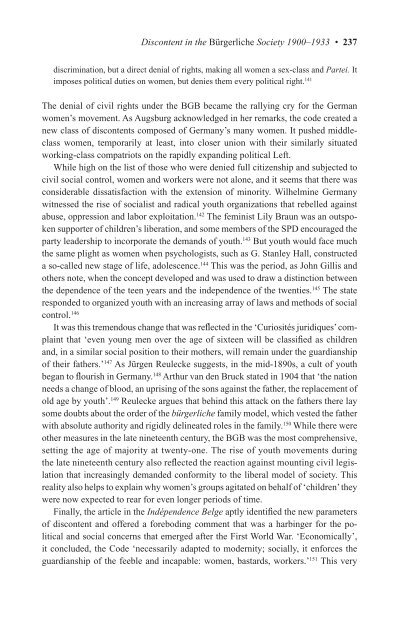Making of a German Constitution : a Slow Revolution
Making of a German Constitution : a Slow Revolution
Making of a German Constitution : a Slow Revolution
Create successful ePaper yourself
Turn your PDF publications into a flip-book with our unique Google optimized e-Paper software.
Discontent in the Bürgerliche Society 1900–1933 • 237discrimination, but a direct denial <strong>of</strong> rights, making all women a sex-class and Partei. Itimposes political duties on women, but denies them every political right. 141The denial <strong>of</strong> civil rights under the BGB became the rallying cry for the <strong>German</strong>women’s movement. As Augsburg acknowledged in her remarks, the code created anew class <strong>of</strong> discontents composed <strong>of</strong> <strong>German</strong>y’s many women. It pushed middleclasswomen, temporarily at least, into closer union with their similarly situatedworking-class compatriots on the rapidly expanding political Left.While high on the list <strong>of</strong> those who were denied full citizenship and subjected tocivil social control, women and workers were not alone, and it seems that there wasconsiderable dissatisfaction with the extension <strong>of</strong> minority. Wilhelmine <strong>German</strong>ywitnessed the rise <strong>of</strong> socialist and radical youth organizations that rebelled againstabuse, oppression and labor exploitation. 142 The feminist Lily Braun was an outspokensupporter <strong>of</strong> children’s liberation, and some members <strong>of</strong> the SPD encouraged theparty leadership to incorporate the demands <strong>of</strong> youth. 143 But youth would face muchthe same plight as women when psychologists, such as G. Stanley Hall, constructeda so-called new stage <strong>of</strong> life, adolescence. 144 This was the period, as John Gillis andothers note, when the concept developed and was used to draw a distinction betweenthe dependence <strong>of</strong> the teen years and the independence <strong>of</strong> the twenties. 145 The stateresponded to organized youth with an increasing array <strong>of</strong> laws and methods <strong>of</strong> socialcontrol. 146It was this tremendous change that was reflected in the ‘Curiosités juridiques’ complaintthat ‘even young men over the age <strong>of</strong> sixteen will be classified as childrenand, in a similar social position to their mothers, will remain under the guardianship<strong>of</strong> their fathers.’ 147 As Jürgen Reulecke suggests, in the mid-1890s, a cult <strong>of</strong> youthbegan to flourish in <strong>German</strong>y. 148 Arthur van den Bruck stated in 1904 that ‘the nationneeds a change <strong>of</strong> blood, an uprising <strong>of</strong> the sons against the father, the replacement <strong>of</strong>old age by youth’. 149 Reulecke argues that behind this attack on the fathers there laysome doubts about the order <strong>of</strong> the bürgerliche family model, which vested the fatherwith absolute authority and rigidly delineated roles in the family. 150 While there wereother measures in the late nineteenth century, the BGB was the most comprehensive,setting the age <strong>of</strong> majority at twenty-one. The rise <strong>of</strong> youth movements duringthe late nineteenth century also reflected the reaction against mounting civil legislationthat increasingly demanded conformity to the liberal model <strong>of</strong> society. Thisreality also helps to explain why women’s groups agitated on behalf <strong>of</strong> ‘children’ theywere now expected to rear for even longer periods <strong>of</strong> time.Finally, the article in the Indépendence Belge aptly identified the new parameters<strong>of</strong> discontent and <strong>of</strong>fered a foreboding comment that was a harbinger for the politicaland social concerns that emerged after the First World War. ‘Economically’,it concluded, the Code ‘necessarily adapted to modernity; socially, it enforces theguardianship <strong>of</strong> the feeble and incapable: women, bastards, workers.’ 151 This very




